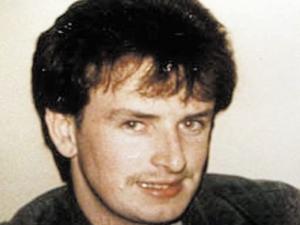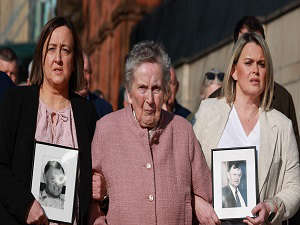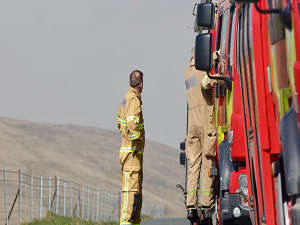
By Q Radio News and M and M News
A former soldier will stand trial for a Troubles-related death after a bid to have the case against him dropped was refused today (Friday.)
David Jonathan Holden (51) will appear at Belfast Crown Court next month when he will be formally charged with unlawfully killing Aiden Martin McAnespie on February 21, 1988.
Mr Justice O'Hara today rejected a legal application made on behalf of Holden to quashed the case, and expressed the hope that a trial can take place before Christmas.
Mr McAnespie died after being shot in the back as he made his way to a GAA match in February 1988.
The 23-year old had just walked past an Army checkpoint on the Monaghan Road in Aughnacloy when he was shot and killed.
Former Grenadier Guardsman David Holden, who was 18 at the time, admitted he fired the fatal shot and claimed his hands were wet and his finger slipped off the trigger guard of his machine gun.
He was initially charged with manslaughter and in September 1988 the charge was dropped. In 2014, following requests by the McAnespie family, the case was re-examined by the Public Prosecution Service (PPS) and a decision not to prosecute Holden was taken.
Following an investigation into the shooting by the Historical Enquires Team, the case was referred back to the PPS in 2016 by the Attorney General.
On this occasion, a decision was made to prosecute the former soldier on a charge of manslaughter.
A 'no bill' application was launched by Holden's defence at Belfast Crown Court on the grounds that the prosecution evidence was not sufficient enough to put him on trial.
Both Holden and several members of Mr McAnespie's family attended the hearing remotely, via videolink.
As he refused the 'no bill' application, Mr Justice O'Hara said that after careful consideration, he satisfied there was "sufficient evidence to justify putting the defendant on trial for manslaughter."
Holden will be formally charged with Mr McAnespie's manslaughter when the case is listed again on September 10.
After being told that the trial is expected to last three weeks, Mr Justice O'Hara said "for many reasons the trial has to be heard sooner rather than later."


 O’Neill writes to PM urging public inquiry into Sean Brown murder
O’Neill writes to PM urging public inquiry into Sean Brown murder
 Campaign to increase cancer awareness through pharmacies rolled out
Campaign to increase cancer awareness through pharmacies rolled out
 Concern over PSNI vehicles fleet, with 20% off road at worst point in 2023
Concern over PSNI vehicles fleet, with 20% off road at worst point in 2023
 Man released by police after Newry stabbing incident
Man released by police after Newry stabbing incident
 Firefighters tackle almost 150 wildfires across three days in Northern Ireland
Firefighters tackle almost 150 wildfires across three days in Northern Ireland